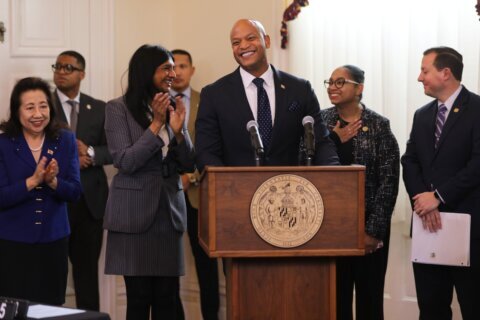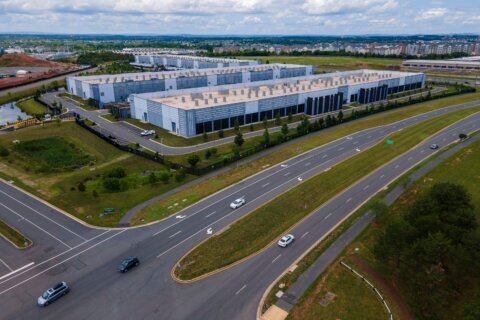This article was republished with permission from WTOP’s news partners at Maryland Matters. Sign up for Maryland Matters’ free email subscription today.
Lawmakers, Moore administration officials and environmentalists have reached a compromise on a data center bill that is enabling a leading green group in the state to drop its opposition to the measure.
Gov. Wes Moore (D) has made legislation to help attract the data center industry to Maryland a top priority for this legislative session.
A major data center campus is in the early stages of development at the site of an old Alcoa aluminum plant in Frederick County. The governor was dismayed last year when one of the companies that had planned to be part of the development pulled out of the project after the Public Service Commission refused to agree to an expedited review of the company’s plans to use 168 diesel generators for backup power at the site.
In response, the Moore administration has introduced a bill that would ease certain required environmental procedures to help lure data centers to the state.
Frederick in particular, given its proximity to data center hubs in Northern Virginia, is poised to benefit. Other parts of the state are also seen as possible candidates for data center campuses, including property near the Calvert Cliffs nuclear energy plant in Lusby. The Prince George’s County Planning Board earlier this month approved construction of a data center on the 87-acre site of the old Landover Mall.
But data centers drain a substantial amount of energy and rely on massive diesel-powered generators for backup power. As a result, several environmental groups, including the Maryland League of Conservation Voters, a major ally of the governor’s, have opposed the measure. LCV said earlier this month it would use votes on the bill as part of its annual legislative scorecard.
It was a noteworthy break, given the alliance between LCV and Moore. Even with the potential threat that the environmental group would be using the vote to evaluate lawmakers, Senate Bill 474 sailed through the Senate on a 43-3 vote in mid-March, with only Sens. Sarah K. Elfreth (D-Anne Arundel), Clarence K. Lam (D-Howard and Anne Arundel), and Karen Lewis Young (D-Frederick), voting against it.
In the weeks since, some environmental leaders, key lawmakers, and Eric Luedtke, Moore’s legislative liaison who used to be the House majority leader, have hammered out a compromise. The bill now directs that 15% of all tax revenues that the state would collect from data center operators would be earmarked for the state’s Strategic Energy Investment Fund, which the Maryland Energy Administration uses to fund clean energy and climate programs.
The House Economic Matters Committee voted on the amended bill Friday afternoon, and it will be on the House floor early next weeks. As a result, Maryland LCV is dropping its opposition to the legislation — its official stance is now neutral — and is telling lawmakers that their votes on this measure will no longer be tallied for the group’s annual report card.
In a letter to lawmakers Friday, Kristen Harbeson, Maryland LCV’s political director, acknowledged the “difficult and complicated situation,” but said the group sees the amended version of the bill as a reasonable compromise.
“We believe that the funding that will be raised to the fulfillment of our climate goals through the… amendment addresses the climate impact without impeding the development of the new industry,” she wrote.
But other environmental groups remain vehemently opposed.
On Friday, the Maryland Legislative Coalition Climate Justice Wing wrote to members of the House Economic Matters Committee reiterating its opposition to the bill and saying it remains “alarmed and concerned with the approach taken in SB474.”
The coalition argues that the legislation sets a bad precedent, undermines the state’s climate mandates, limits the authority of the Public Service Commission to consider climate change when granting certain permits, and gives the data centers carte blanche for using diesel generators.
The group also told lawmakers it hopes to see more comprehensive legislation offering guidelines for data centers in the 2025 General Assembly session.
Assuming the amended bill passes the House it must go back to the Senate for concurrence.
Meanwhile, SB 861, a bill from Young that would require the state to study ways to make data center companies that do business in Maryland commit to reducing their greenhouse gas emissions over a period of time, is bottled up in the Senate Committee on Education, Energy and the Environment, where it is likely to remain.
The story has been updated to include reference to a letter that the Maryland Legislative Coalition Climate Justice Wing wrote to lawmakers on Friday.







